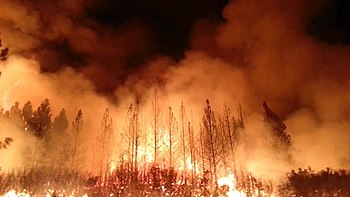* 9/11/2020 Update: I am reposting this 2018 blog summary of warnings about climate change-related wildfires given the catastrophies out West -
and please note the NBC Nightly News' long-overdue lede -
- linking climate change to permanent fire conditions:
---------------------------------------------------------
[Update from July 29, 2018 I wrote last week that there was a dearth of linkages in some reporting about wildfires and climate change,
---------------------------------------------------------------------
2007:
In the wake of California's devastating fires, scientists are reminding us that there were findings published last year indicating that forest fires have been on the increase in the US and Canada for many years, with a longer "fire season" due to persistently dry conditions
2012:
The Union of Concerned Scientists sees a link between a warming climate and greater wildfire danger:
Update: From former NY Times environmental writer, and author Andrew Revkin, now at ProPublica, replying to my post.
Follow him on Twitter.
@Revkin
How long do we have to wait for TV news anchors and weather forecasters to incorporate basic, consensus science about climate change into their correspondents' coverage of increasingly devastating fires and floods in a demonstrably warmed and warming climate?
While many state officials and governors, like Scott Walker, have nothing to say about it, or worse, as documented repeatedly on this blog, here, here, or here, and elsewhere.However, here's a report on 'the new normal' and a few examples of those earlier linkages posted on this blog:
---------------------------------------------------------------------
2007:
In the wake of California's devastating fires, scientists are reminding us that there were findings published last year indicating that forest fires have been on the increase in the US and Canada for many years, with a longer "fire season" due to persistently dry conditions
2012:
The Upper-Midwest had not been immune to US forest fires in what has been an early outbreak in 2012, as the Capital Times reported on May 31:
Wisconsin Department of Natural Resources personnel and equipment have been dispatched to the Upper Peninsula of Michigan to help fight a large forest fire in Luce County...
The Duck Lake fire has consumed more than 21,000 acres...
The fire runs from Lake Superior to the south for about 11 miles, to about 14 miles north of Newberry, with 40 miles of fire line.
Here's a bigger picture, according to The Washington Post:
Wisconsin Department of Natural Resources personnel and equipment have been dispatched to the Upper Peninsula of Michigan to help fight a large forest fire in Luce County...
The Duck Lake fire has consumed more than 21,000 acres...
The fire runs from Lake Superior to the south for about 11 miles, to about 14 miles north of Newberry, with 40 miles of fire line.
Here's a bigger picture, according to The Washington Post:
Colorado and U.S. Forest Service firefighters are battling the state’s most destructive wildfires ever. Lightning and suspected arson ignited them four weeks ago, but scientists and federal officials say the table was set by a culprit that will probably contribute to bigger and more frequent wildfires for years to come: climate change...2015:
“We’ve had record fires in 10 states in the last decade, most of them in the West,” said USDA Undersecretary Harris Sherman, who oversees the U.S. Forest Service.
The Washington Post noted yesterday the continuing research which indicates massive tree die-off in the US Southwest due to a warming climate:
In a troubling new study just out in Nature Climate Change, a group of researchers says that a warming climate could trigger a “massive” dieoff of coniferous trees, such as junipers and piñon pines, in the U.S. southwest sometime this century.March, 2018:
The Union of Concerned Scientists sees a link between a warming climate and greater wildfire danger:
As the world warms, we can expect more wildfires
Wildfire seasons (seasons with higher wildfire potential) in the United States are projected to lengthen, with the southwest’s season of fire potential lengthening from seven months to all year long. Additionally, wildfires themselves are likely to be more severe.------------------------------------------------------------------------------------------
Update: From former NY Times environmental writer, and author Andrew Revkin, now at ProPublica, replying to my post.
Follow him on Twitter.
@Revkin
Important to discuss #climatechange factor in fire behavior as long as coverage focus is the far more consequential (& also ignored) driver of wildfire losses & risk - the #expandingbullseye of development in fire red zones: https://twitter.com/search?f=tweets&q=%23expandingbullseye%20%40revkin%20fire&src=typd … and: https://www.google.com/search?safe=active&ei=Es9dW_u9POOD5wLnyqjIBw&q=burning+issues+wildfire+west+revkin+dotearth&oq=burning+issues+wildfire+west+revkin+dotearth&gs_l=psy-ab.3...20371.24899.0.25090.19.17.2.0.0.0.178.1859.7j9.16.0....0...1.1.64.psy-ab..1.16.1593...35i39k1j33i160k1j33i21k1.0.YYOh-LO9b_Y …




No comments:
Post a Comment